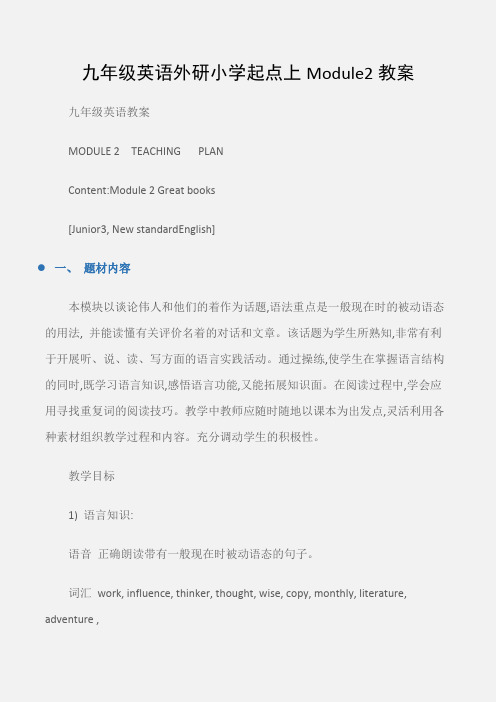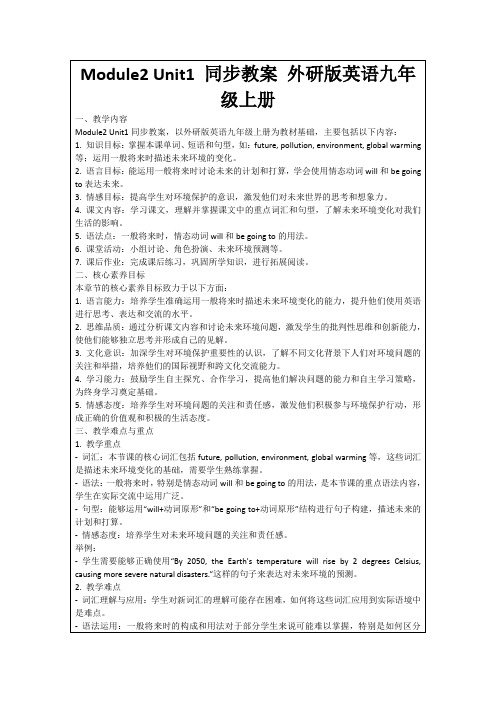外研版九年级英语上模块二教案
外研版九年级英语上模块二教案

外研版九年级英语上模块二教案篇一:外研版九年级英语上模块二教案Module 2 Great books王爱霞一、教学内容分析本模块的话题是谈论书、作家、思想家、戏剧、电影、诗歌等。
语法是一般现在时被动语态。
二、学情分析谈论书、作家、思想家等是学生感兴趣的话题。
本模块的学习是通过该话题的讨论,学习并掌握一般现在时被动语态的肯定句、否定句、一般疑问句和特殊疑问句。
三、教学目标1、语言知识目标:● 功能:谈论书、作家、思想家等。
● 词汇:1)能正确使用下列单词:work,influence,respect,wise,literature,behaviour,cave,freedom,funeral,social,theme,treasure,clever ,dead,pleased, alive, southern, state.2) 理解下列单词:thinker, monthly, outsider, version, historical,editor, publisher, reviewer.3)能准确理解并使用下列词组;as far as,not?anymore,millions of,run away, grow up, talk about, be known as/for● 语法:一般现在时被动语态。
2、语言技能目标听:通过听进行单词和图片的配对。
说:谈论最喜欢的书、戏剧、诗歌和作家等。
读:能读懂对书、作家、思想家等作介绍的文章,能掌握从文章到表格的信息转移。
写:写一本自己最喜欢的书。
3、情感目标:培养学生阅读的习惯,提高个人文化修养。
4、文化意识目标:了解中外著名的作家、思想家、诗人及他们的作品。
四、教学重点、难点重点:key vocabulary___work,influence,wise,clever,behaviour,dead,alive,treasuretheme, southern,as far as,not?any more,millions of,run away,grow up,talk about, be known as/for难点:被动语态的构成和用法,主动语态如何改为被动语态。
Module2Unit1外研版英语九年级上册教案详解

(三)实践活动(用时10分钟)
1.分组讨论:学生们将分成若干小组,每组讨论一个喜欢的西方音乐类型,并探讨这种音乐给他们的感受。
2.实验操作:为了加深理解,我们将进行一个简单的音乐欣赏活动。通过聆听不同类型的音乐,学生尝试用现在进行时态描述音乐的特点。
(二)新课讲授(用时10分钟)
1.理论介绍:首先,我们要了解西方音乐的基本概念。西方音乐有着丰富的类型,如古典、爵士、蓝调等。每种音乐都有其独特的风格和表达的情感。了解和欣赏西方音乐是拓宽我们文化视野的重要途径。
2.案例分析:接下来,我们来看一个具体的案例。这个案例展示了爵士乐的特点和它在放松心情方面的应用。
举例:通过音乐表演和实时描述,让学生感受并运用现在进行时态。
(4)阅读理解:理解课文内容,提取关键信息,提高阅读技能。
举例:设计问题链,引导学生逐步深入理解课文,提取音乐类型、乐器、音乐感受等关键信息。
2.教学难点
(1)词汇的准确运用:学生在使用新学词汇时可能会出现搭配不当或语境误用的情况。
突破方法:通过例句展示、同义词对比和词汇游戏等方式,加强学生对词汇用法的理解。
突破方法:引入相关的文化背景知识,通过视频、讨论等形式,增强学生对西方音乐文化的认识和理解。
四、教学流程
(一)导入新课(用时5分钟)
同学们,今天我们将要学习的是《Module 2 Unit 1外研版英语九年级上册》的"Western music"这一章节。在开始之前,我想先问大家一个问题:“你们在日常生活中喜欢听什么类型的音乐?”这个问题与我们将要学习的内容密切相关。通过这个问题,我希望能够引起大家对音乐类型的兴趣和好奇心,让我们一同探索西方音乐的奥秘。
新外研版九年级上册英语 Module 2 Unit 2 教案(教学设计)

Module 2 Public holidaysUnit 2 We have celebrated the festival since the first pioneers arrived in America.单词among, speech, pioneer, grow, corn,1. To master the new words.2. To learn some expressions about Thanksgiving.3. To learn the adverbial clause of time.1. To get information from the article.2. To write a composition by using the adverbial clause of time.Step 1情景导入1.The teacher shows the pictures of Thanks giving and asks questions.T:Which festival is this?S:Thanksgiving.T:Great. When is it celebrated, do you know?S:On the fourth Thursday in November.T:Do you want to know how it is celebrated?S:Yes.T:Now let\'s look at the pictures and learn about it.2.T:Last period, we read the passage about Thanksgiving. We learn about its facts. Can you tell me its date, meaning, history and celebration?S1:…S2:…T:You may forget some of the facts. You should read the passage again.Step 2完成教材 Activity 1的任务和教材 Activities 3,4的任务。
(九年级英语教案)九年级英语外研小学起点上Module2教案

九年级英语外研小学起点上Module2教案九年级英语教案MODULE 2 TEACHING PLANContent:Module 2 Great books[Junior3, New standardEnglish]一、题材内容本模块以谈论伟人和他们的着作为话题,语法重点是一般现在时的被动语态的用法, 并能读懂有关评价名着的对话和文章。
该话题为学生所熟知,非常有利于开展听、说、读、写方面的语言实践活动。
通过操练,使学生在掌握语言结构的同时,既学习语言知识,感悟语言功能,又能拓展知识面。
在阅读过程中,学会应用寻找重复词的阅读技巧。
教学中教师应随时随地以课本为出发点,灵活利用各种素材组织教学过程和内容。
充分调动学生的积极性。
教学目标1) 语言知识:语音正确朗读带有一般现在时被动语态的句子。
词汇work, influence, thinker, thought, wise, copy, monthly, literature, adventure ,behaviour , cave , freedom , funeral , century ,outsider , pretty , social , theme , treasure , clever , dead ,hide-hid-hidden , pleased , alive , punish , state , southernversion , historical , actually , rewrite-rewrote-rewritten , intend , rather ,publisher , reviewer , unpleasant词组What's up? as far as , not …any more , millions of , at the end of , run away , grow up , talk about语法一般现在时的被动语态的概念和用法功能掌握表示同意和不同意的表达方式,如I gree/ I don't agree话题以"谈论伟人和他们的着作为"为话题。
外研版九年级英语上册教案M2U2

1. It's time for ...到做……的时候了
2. make a speech / make speeches做讲演
3. give thanks for感谢……
4. lay the table摆放餐具
5. too much太多
6. tell stories / tell a story讲故事
2.能够正确运用时间状语从句
3.能够读懂有关感恩节介绍的文章
4.描述自己喜欢的节日
教学方法及手段
Top-down approach, PWP
教学过程(按Preparation-Presentation-Practice-Production-Summary流程设计)
教学环节
师生活动
设计意图
时间
Step I Pre-listening
3)Take turns asking and answer the questions
4)Read through their answers and try to add some more interesting pieces of information about the festival
Doctor Wang is talking about how _____ _______ _________.
3.饭前我经常帮忙摆放餐具。
I often help ____ _____ _____ before dinner.
4.我们都需要大量的睡眠。
We all need _____ ______ sleep.
Ss:
1.Match the heading
1)Ask students to cover the text and read the headings. Then play the recording, students listen and then match the heading with the paragraphs.
Module2Unit1同步教案外研版英语九年级上册

4.学习能力:鼓励学生自主探究、合作学习,提高他们解决问题的能力和自主学习策略,为终身学习奠定基础。
5.情感态度:培养学生对环境问题的关注和责任感,激发他们积极参与环境保护行动,形成正确的价值观和积极的生活态度。
-句型:能够运用“will+动词原形”和“be going to+动词原形”结构进行句子构建,描述未来的计划和打算。
-情感态度:培养学生对未来环境问题的关注和责任感。
举例:
-学生需要能够正确使用“By 2050, the Earth's temperature will rise by 2 degrees Celsius, causing more severe natural disasters.”这样的句子来表达对未来环境的预测。
具体难点内容:
-词汇应用:例如,学生可能知道“pollution”的意思,但在具体描述环境污染的影响时,可能不知道如何运用。
-语法区分:解释何时使用“will”表示突发或未计划的未来事件,何时使用“be going to”表示计划或打算做的事情。
-情感认同:通过讨论和角色扮演等活动,帮助学生理解环境问题的紧迫性,并激发他们的情感共鸣。
在新课讲授环节,我发现理论介绍部分,学生们对一般将来时的理解和掌握程度较好。但在案例分析环节,有些学生在将一般将来时应用到具体情境中时遇到了困难。这让我意识到,在今后的教学中,需要更多地设计一些实际情境,让学生在实践中掌握语法知识。
实践活动环节,分组讨论和角色扮演活动让学生们积极参与,课堂氛围十分活跃。但我也观察到,有些小组在讨论过程中,个别成员参与度不高。针对这个问题,我计划在下次活动中,更加关注每个学生的参与情况,鼓励他们积极投入到小组讨论中。
外研版英语九年级上册Module-2单元教案

Let’s wait until the rain stops.We won’t start until Bob comes.Don’t get off(从下来)until the bus stops.【Till是指直到某一特定事件发生的时候,而在那个时刻之后,该事情或状况仍将持续。
Until是指直到某一特定事件发生的时候,而讲话的人在自己心里认为,在那个时刻之后,该事情或该状况将中止(不怎么可能持续)。
固定组合里from morning till night,till/until是不能替换的,】1、until 既可作介词,也可作连词,通常有一下几种用法☺用于肯定句中,作“直到......为止”讲时,主句的谓语动词一般是延续到unt il 所指的动作或时间为止。
He waits until the children are asleep.他一直等到孩子们睡着。
We stayed there until it was dark. 我们在那一直呆到天黑。
☺用于否定句中,作“直到......才”讲时,主句的谓语动词一般是非延续性动词,表示主句的动作直到until所指的动作或时间才发生。
He didn't come until late in the evening.他直到晚上很晚才来。
Tom didn't go to bed until he finished his homework. Tom 直到写完作业才睡觉。
ex. 他昨晚直到十二点钟才睡觉。
___________________________________________.重点短语句型:1. The People’s Republic of China was founded on 1st October 1949.found表示“建立,创立”。
它的过去式和过去分词都加ed。
find表示“找到”,它的过去式和过去分词为found。
外研版英语九年级上册模块2,Unit 2 读写教案

Module2 Pubic holidaysUnit1 My family always go somewhere interesting as soon asthe holiday begins(听说课教案)Ⅰ、Teaching model:Listening and speakingⅡ、Teaching method:Communicative approachⅢ、Teaching Objectives●Knowledge objectiveKey vocabulary:found.since then.flag.until.off.all kinds of .vacation .take a vacation. season. kid. have fun. band .UK. as soon as.fourth.sixth.seventh.eighth.ninth.tenth.twentieth.twelfth.Key structures:●Ability objective1. To listen and understand sentences with adverbial clauses.2. To understand the conversation.3. To learn to use dates●Moral objective1.To talk about Chinese public holidays.2. To develop the ability to cooperate with others.Ⅳ、Teaching importance and difficulty1. To learn about some expressions in the passage.2. To learn to use adverbial clausesV、Teaching methodPWP method, task-based methodVI、Teaching aidsA tape recorder, multimedia and some picturesⅦ、Teaching ProceduresLearning Aims (学习目标)1.To listen and understand the conversation with adverbial clauses.2.. To learn to use the patterns with adverbial clauses correctly:…after.as soon as .before. since. until .when. while3. To talk about public holidays.4. To remember the words and expressions(师傅学友明确学习任务)Step 1: Check the new words . (学习单词)1.师友朗读found.since then.flag.until.off.all kinds of .vacation .take a vacation. season. kid. have fun. band .UK. as soon as.fourth.sixth.seventh.eighth.ninth.tenth.twentieth.twelfth.(师傅注意学友的发音)2.教师检查Task1:请快速说出你看到的单词(师友举手抢答)Step 2: Talk and learn.(学习对话)I.师友听读感知1)Look and talk about the picture.(Activity 1)2)Complete the sentences with the dates(Activity2)(先自主完成再互助交流)3)Listen and check.(先自主完成再互助交流)4)Listen to the passage and pay attention to the pronunciation.5)Read again and complete the table.(Activity3)(先自主完成再互助交流)( 1)学友自主在课文中找到每日英语原句勾画出来When is your national day?Do you have any plans for?We only have one day off.( 2)学友读给师傅听,互助交流用法。
- 1、下载文档前请自行甄别文档内容的完整性,平台不提供额外的编辑、内容补充、找答案等附加服务。
- 2、"仅部分预览"的文档,不可在线预览部分如存在完整性等问题,可反馈申请退款(可完整预览的文档不适用该条件!)。
- 3、如文档侵犯您的权益,请联系客服反馈,我们会尽快为您处理(人工客服工作时间:9:00-18:30)。
外研版九年级英语上模块二教案
篇一:外研版九年级英语上模块二 Module 2 Great books 王爱霞一、教学内容分析本模块的话题是谈论书、作家、思想家、戏剧、电影、歌等。
语法是一般现在时被动语态。
二、学情分析谈论书、作家、思想家等是学生感兴趣的话题。
本模块的学习是通过该话题的讨论,学习并掌握一般现在时被动语态的肯定句、否定句、一般疑问句和特殊疑问句。
三、教学目标 1、语言知识目标: ● 功能:谈论书、作家、思想家等。
● 词汇:1)能正确使用下列单词:work,influence,respect,wise,literature,
behaviour,cave,freedom,funeral,social,theme,treasure,clever,dead, pleased, alive, southern, state. 2) 理解下列单词:thinker, monthly, outsider, version, historical, editor, publisher, reviewer. 3)能准确理解并使用下列词组;as far as,not?any more,millions of, run away, grow up, talk about, be known as/for ● 语法:一般现在时被动语态。
2、语言技能目标听:通过听进行单词和图片的配对。
说:谈论最喜欢的书、戏剧、诗歌和作家等。
读:能读懂对书、作家、思想家等作介绍的文章,能掌握从文章到表格的信息转移。
写:写一本自己最喜欢的书。
3、情感目标:培养学生阅读的习惯,提高个人文化修养。
4、文化意识目标:了解中外著名的作家、思想家、诗人及他们的作品。
四、教学重点、难点重点:key vocabulary___work, influence,wise,clever,behaviour,dead,alive,treasure theme, southern,as far as,not?any more,millions of,run away,grow up,talk about, be known as/for 难点:被动语态的构成和用法,主动语态如何改为被动语态。
五、课时安排第一课时:Unit 1 第二课时;Unit 2 第三课时:Unit 3 第四、五课时:Review and workbook Unit 1 Confucius’ works are read by many people Teaching aims :Learn the use of present simple passive. Key points: work, influence, thought, wise, copy, as far as, not?any more, millions of, be known as/forDifficult sentences: Shakespeare’s works are seen by millions of people every year. Mark Twain was an important writer, but he isn’t known as a great thinker like Confucius. Step 1 Warming up leading in 1. Ask the students some questions. Do you like reading books? What’s
your favourite book?Who’s your favourite writer? 2. Show three pictures about Confucius, Shakespeare and Mark Twain. Let them guess who they are. Can you say something about them? Teach the words : work, influence, play, poem, respect, thinker, thought, wise, writer. Confucius: He was a great thinker in China. He is known for his wise thought. We are still influenced by his thought. He is respected by us. Shakespeare: He was a writer of plays and poems. Some of his most famous plays are Hamlet and Romeo and Juliet. He was born in 1564 in England. His plays are seen by millions of people every year. Mark Twain: He was a famous American writer. He wrote a lot of stories. His books are still popular. For example ,The Adventures of Tom Sawyer. 3.Do Activity 5. Complete the sentences with the correct form of the words. Step 2 Listening (Act.1 2) 1. First read the words in the box .Then match the words in the box with the people in the pictures.(Act.1) 2. Listen and check your answer to Act.1.(Act.2) step 3 Listening and reading(Act.3、4) 1. Listen and answer .Where are the speakers? What are they talking about? 2 .Read and answer the questions.(Act.4) 3.Everyday English and language points. What’s up? Go on! Sounds like a good idea. as far as, not ?any more, millions of ,be known as/for 4.Read the conversation in two groups. Step 4 Grammar practice 1. Underline the sentences in the conversation that have the pattern of passive voice. 2. Read the sentences aloud. 3. Do WB Exercise 1 on p116 Step 5 Speaking and writing 1.Do Act.8 Work in groups of three and look at the opinions in the table. Report ideas of your group to the whole class. 2.Do Act.6 Talk about your favourite play/poem/thinker/writer/story. Homework 1. write your favourite play/poem/thinker/writer/story. 2. Listen and read the conversation. 3. Search the internet about the book called The Adventures of Tom Sawyer. Unit 2 It’s still read and loved Teaching aims篇二:外研英语九年级上册第二模块教案沿庄镇中学教科室制沿庄镇中学教科室制
沿庄镇中学教科室制沿庄镇中学教科室制篇三:外研英语九年级上册第一模块教案沿庄镇中学教科室制沿庄镇中学教科室制沿庄镇中学教科室制沿庄镇中学教科室制沿庄镇中学教科室制。
